高中英语知识点总结必修1重点句型Which kind of transport do you prefer to use- bus or train?
高中英语知识点总结必修一unit译林版
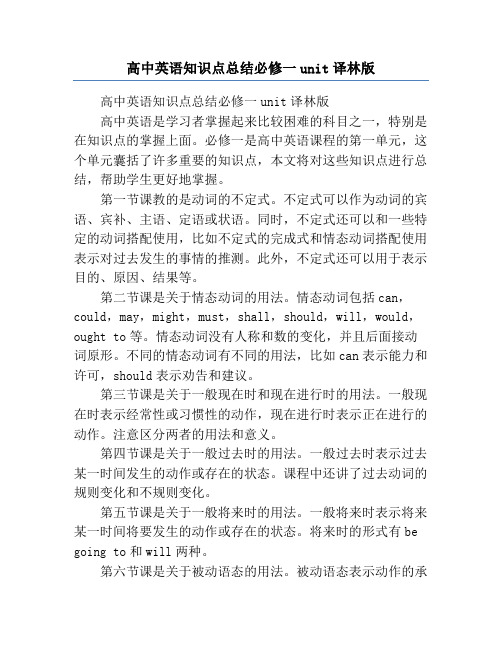
高中英语知识点总结必修一unit译林版高中英语知识点总结必修一unit译林版高中英语是学习者掌握起来比较困难的科目之一,特别是在知识点的掌握上面。
必修一是高中英语课程的第一单元,这个单元囊括了许多重要的知识点,本文将对这些知识点进行总结,帮助学生更好地掌握。
第一节课教的是动词的不定式。
不定式可以作为动词的宾语、宾补、主语、定语或状语。
同时,不定式还可以和一些特定的动词搭配使用,比如不定式的完成式和情态动词搭配使用表示对过去发生的事情的推测。
此外,不定式还可以用于表示目的、原因、结果等。
第二节课是关于情态动词的用法。
情态动词包括can,could,may,might,must,shall,should,will,would,ought to等。
情态动词没有人称和数的变化,并且后面接动词原形。
不同的情态动词有不同的用法,比如can表示能力和许可,should表示劝告和建议。
第三节课是关于一般现在时和现在进行时的用法。
一般现在时表示经常性或习惯性的动作,现在进行时表示正在进行的动作。
注意区分两者的用法和意义。
第四节课是关于一般过去时的用法。
一般过去时表示过去某一时间发生的动作或存在的状态。
课程中还讲了过去动词的规则变化和不规则变化。
第五节课是关于一般将来时的用法。
一般将来时表示将来某一时间将要发生的动作或存在的状态。
将来时的形式有be going to和will两种。
第六节课是关于被动语态的用法。
被动语态表示动作的承受者放在句子主语的位置,而动作的执行者放在句子的谓语位置。
被动语态的构成为be + 过去分词。
第七节课是关于名词性从句的用法。
名词性从句可以作主语、宾语、表语或同位语。
名词性从句的引导词有连词that,wh-引导的词(如what,who,which,when等)和whether。
第八节课是关于定语从句的用法。
定语从句修饰某一名词或代词,并且放在名词或代词之后。
常见的关系词有who,whom,which,that和whose等。
高中英语必修一第三单元重点、难点

高中英语必修一第三单元重点、难点Unit Three Travel journal1、Which kind of transport do you prefer to use, bus or train?你更喜欢那种交通工具,汽车还是火车?prefer 更喜欢用法归纳:(1)+名词.---Which do you prefer, tea or coffee? 你更喜欢什么, 茶还是咖啡?--- I prefer tea. 我更喜欢茶。
(2)+ 不定式Our daughter prefers to stay at home today. 我们女儿今天喜欢呆在家里。
(3)+动名词Many people prefer swimming in summer. 许多人夏天喜欢游泳。
特别提示:prefer to do表示某一次的动作;prefer doing表示经常性的习惯动作。
(4)prefer sb. to do sth. 更喜欢某人做某事We prefer you to tell us the truth. 我们更喜欢你给我们说实话。
(5)prefer that从句My wife prefers that I come home on time every day. 我妻子更喜欢我每天按时回家。
(6)prefer A to B 比起B来更喜欢A / 喜欢A胜过喜欢BMost students prefer Chinese to English. 比起英语来,大部分同学更喜欢汉语。
特别提示:在prefer A to B句型中,A和B既可以是名词,也可以是动名词。
并且考查动名词的几率更大。
(7)prefer to do rather than do 宁愿做某事而不愿做某事I prefer to stay at home rather than go out. 今天我宁愿呆在家里也不愿出去。
特别提示:1、考查prefer to do rather than do时,常常会把rather than do放在句首,无论放在什么位置,只要同学们记住了这个句型,就不难选出答案。
必修一unit 3单元

Prefer sb to do 宁愿某人做某事
Prefer Prefer
A to B doing
st与h tBo相d比oi,ng更s喜th欢宁A愿做某事而不愿意做某事
Prefer to do sth rather than do sth. 宁愿做某事,而不愿做某事
I prefer to work /working in the mountain area. I’d prefer you to drive, if you don’t mind. She prefers jazz to rock music. I would prefer reading books to watching TV.
expense : 常指实际支付的费用总数 额,有时也指钱的花费。 I can't afford the expense of redecorating my house. 我负担不起 重新装修房子的费用。
Flow Look at the map on page 18 and list the countries that the Mekong River flows through. 看第18 页上的地图并列出湄公河流经的国家。
bit late, so could you save me a place?
近来交通拥挤,我可能会到得晚一点儿,你能给我留个位 子么?
2.Prefer Prefer ut.(preferred, preferred ; preferring)更喜欢,喜 欢
Prefer to do sth/ doing sth.更喜欢做某事。
例:I have known him ever since he was a child. 他从小我就 认识他了。 这种用法同since 差不多,不过 ever since 比 since 用得少。 再如:We have lived in Shanghai ever since we came to China.( 自从我们来到中国之后就住在上海
人教高一英语必修一Unit-1知识点总结带例句
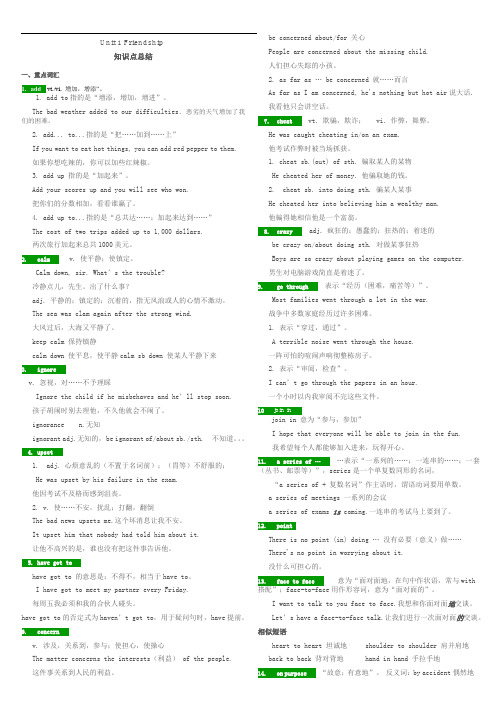
Unit 1 Friendship知识点总结一、重点词汇1. vt./vi. 增加,增添”。
1. add to指的是“增添,增加,增进”。
The bad weather added to our difficulties.恶劣的天气增加了我们的困难。
2. add... to...指的是“把……加到……上”If you want to eat hot things, you can add red pepper to them.如果你想吃辣的,你可以加些红辣椒。
3. add up 指的是“加起来”。
Add your scores up and you will see who won.把你们的分数相加,看看谁赢了。
4. add up to...指的是“总共达……;加起来达到……”The cost of two trips added up to 1,000 dollars.两次旅行加起来总共1000美元。
2. v. 使平静;使镇定。
Calm down, sir. What’s the tr ouble?冷静点儿,先生。
出了什么事?adj. 平静的;镇定的;沉着的,指无风浪或人的心情不激动。
The sea was clam again after the strong wind.大风过后,大海又平静了。
keep calm 保持镇静calm down 使平息,使平静calm sb down 使某人平静下来3.v. 忽视,对……不予理睬Ignore the child if he misbehaves and he’ll stop soon.孩子胡闹时别去理他,不久他就会不闹了。
ignorance n.无知ignorant adj.无知的, be ignorant of/about sb./sth. 不知道。
1. adj. 心烦意乱的(不置于名词前);(胃等)不舒服的;He was upset by his failure in the exam.他因考试不及格而感到沮丧。
高一英语必修一知识点总结之重点句型汇总
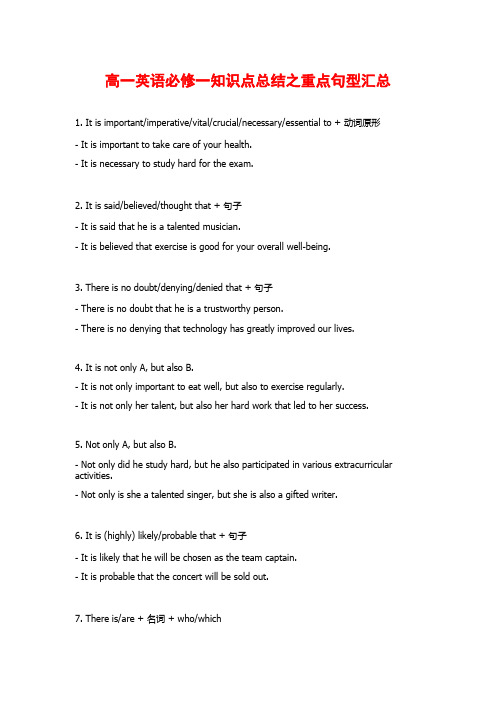
高一英语必修一知识点总结之重点句型汇总1. It is important/imperative/vital/crucial/necessary/essential to + 动词原形- It is important to take care of your health.- It is necessary to study hard for the exam.2. It is said/believed/thought that + 句子- It is said that he is a talented musician.- It is believed that exercise is good for your overall well-being.3. There is no doubt/denying/denied that + 句子- There is no doubt that he is a trustworthy person.- There is no denying that technology has greatly improved our lives.4. It is not only A, but also B.- It is not only important to eat well, but also to exercise regularly.- It is not only her talent, but also her hard work that led to her success.5. Not only A, but also B.- Not only did he study hard, but he also participated in various extracurricular activities.- Not only is she a talented singer, but she is also a gifted writer.6. It is (highly) likely/probable that + 句子- It is likely that he will be chosen as the team captain.- It is probable that the concert will be sold out.7. There is/are + 名词 + who/which- There are many students who want to join the school club.- There is a doctor who specializes in treating rare diseases.8. The more A, the more B.- The more you practice, the better you will become.- The more you study, the higher your grades will be.9. It is not until + 过去时 + that + 句子- It is not until he saw the doctor that he realized how serious his illness was.- It was not until I read the book that I understood the underlying message.10. It is + 形容词 + that + 句子- It is interesting that she chose to study abroad.- It is impressive that he managed to finish the project ahead of schedule.这些句型在高一英语必修一的学习中经常会用到,掌握这些句型可以帮助你更好地表达自己的观点和思路。
高一英语重要必修1知识点总结
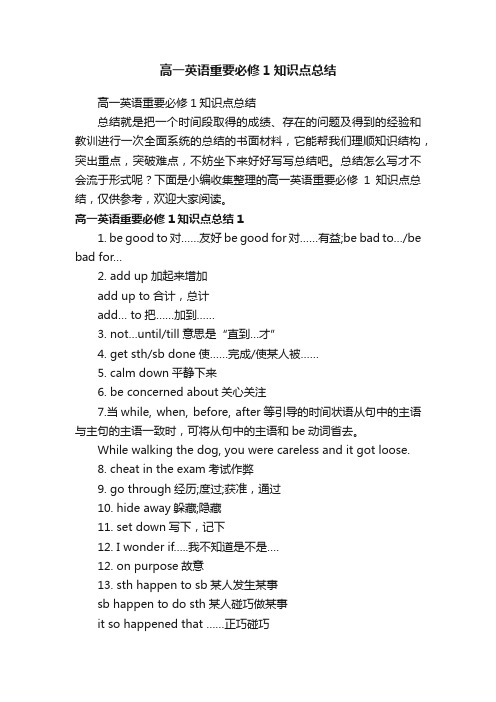
高一英语重要必修1知识点总结高一英语重要必修1知识点总结总结就是把一个时间段取得的成绩、存在的问题及得到的经验和教训进行一次全面系统的总结的书面材料,它能帮我们理顺知识结构,突出重点,突破难点,不妨坐下来好好写写总结吧。
总结怎么写才不会流于形式呢?下面是小编收集整理的高一英语重要必修1知识点总结,仅供参考,欢迎大家阅读。
高一英语重要必修1知识点总结11. be good to对……友好be good for对……有益;be bad to…/be bad for…2. add up加起来增加add up to合计,总计add… to把……加到……3. not…until/till意思是“直到…才”4. get sth/sb done使……完成/使某人被……5. calm down平静下来6. be concerned about关心关注7.当while, when, before, after等引导的时间状语从句中的主语与主句的主语一致时,可将从句中的主语和be动词省去。
While walking the dog, you were careless and it got loose.8. cheat in the exam考试作弊9. go through经历;度过;获准,通过10. hide away躲藏;隐藏11. set down写下,记下12. I wonder if…..我不知道是不是….12. on purpose故意13. sth happen to sb某人发生某事sb happen to do sth某人碰巧做某事it so happened that ……正巧碰巧14. It is the first (second…) that… (从句谓语动词用现在完成时)15. in one’s power处于……的控制之中16. It’s no pleasure doing….做…..没有乐趣It’s no good/ use doing sth.做某事是没好处/没用的17. She found it difficult to settle and calm down in the hiding place. it做形式宾语18. suffer from患…病;遭受19. so…that… /such…thay…20. get tired of….对…感到劳累疲惫21. have some trouble with sb/sth.在……上遇到了麻烦22. get along with sb/sth.与某人相处23. ask(sb)for advice. (向某人)征求建议24. make后接复合宾语,宾语补足语须用不带to的不定式、形容词、过去分词、名词等。
必修一unit_1重点句型

必修一unit_1重点句型
一,直接引语连接句
1. 他说:"我会等你。
"
2. 她问道:“你怎么可以保证呢?”
3. 他回答道:“因为我承诺了。
”
4. 苏珊对我说:“这个计划要是你现在就实施好,就可能会有好处了。
”
5. 汤姆询问:“有什么可以表示你给我的支持吗?”
6. 吉姆答道:“当然有!我会一直支持你,不管出现什么情况。
”
二,一般疑问句
1. 你认为应该怎么做?
2. 你如何理解这件事?
3. 你什么时候想开始工作?
4. 你觉得这个计划如何实施?
5. 你觉得我的计划行得通吗?
6. 你希望成功吗?
三,特殊疑问句
1. 什么使你有信心?
4. 为什么你不能努力奋斗?
四,反意疑问句
1. 你不觉得你应该多试试吗?
2. 你就不希望赢得这场比赛了吗?
3. 你不想面对这个问题了吧?
4. 你不想继续努力工作下去吗?
5. 你不认为它还有可能实现吗?
6. 你不认为成功只是困难的挑战吗?。
英语必修一unit1的重点单词短语句型

英语必修一unit1的重点单词短语句型Key Words:1. Acquaintance: A person known to one but usually not a close friend. Example sentence: I met John at a party last night. He seems like a nice acquaintance.2. Ally: A person who cooperates with another in order to achieve a common goal.Example sentence: The two countries formed an alliance to fight against terrorism.3. Companion: A person who accompanies or spends time with another.Example sentence: My dog Charlie is my loyal companion.4. Trustworthy: Able to be relied on as honest or truthful.Example sentence: Sarah is a trustworthy friend. I can always count on her to keep a secret.5. Loyal: Giving or showing unwavering support or allegiance to someone or something.Example sentence: Despite the challenges, John remained loyal to his team till the end.6. Dependable: Able to be trusted or relied on.Example sentence: Tom is a dependable friend. Whenever I need help, he is there for me.7. Respectful: Feeling or showing deference and respect.Example sentence: It is important to be respectful towards your elders.8. Genuine: Truly what something is said to be; authentic.Example sentence: I appreciate people who are genuine and honest.9. Enthusiastic: Having or showing intense and eager enjoyment, interest, or approval.Example sentence: Lucy is always enthusiastic about trying new things.10. Frank: Open, honest, and direct in speech or writing.Example sentence: I appreciate your frankness in telling me the truth.Key Phrases:1. Keep in touch: To maintain regular communication with someone.Example sentence: Even though we live far apart, we try to keep in touch through phone calls and video chats.2. Get along with: To have a friendly and harmonious relationship with someone. Example sentence: Jack gets along well with all his classmates.3. Fall out with: To have a disagreement or argument with someone that leadsto the end of a friendship.Example sentence: Rachel fell out with her best friend after they had a misunderstanding.4. Make up: To reconcile after a disagreement or argument.Example sentence: After their fight, Jane and Maria made up and are friends again.5. Let down: To disappoint or fail to support someone who was relying on you. Example sentence: Mark felt really let down when his friend didn't show up for their planned outing.6. Break up: To end a romantic relationship.Example sentence: After years of dating, Sarah and Mike decided to break up.7. Come across: To meet or find by chance.Example sentence: I came across an old photo of us while cleaning out my closet.8. Hang out: To spend time with someone casually.Example sentence: We like to hang out at the park and play frisbee on the weekends.9. Put up with: To tolerate or endure someone or something unpleasant.Example sentence: It's not easy to put up with my noisy neighbors.10. Look up to: To admire or have great respect for someone.Example sentence: I look up to my older brother because he is very successful.Key Sentence Structures:1. Comparatives and Superlatives: This unit introduces the use of comparativesand superlatives to compare different qualities of people or things.Example sentences:- Mary is taller than her sister.- The Great Wall of China is one of the longest walls in the world.2. Irregular Verbs: Students will learn and practice using irregular verbs in sentences.Example sentences:- I went to the park yesterday.- He has sung in many concerts.3. Present Continuous Tense: The present continuous tense is used to describe actions happening at the time of speaking or ongoing actions.Example sentences:- We are watching a movie right now.- She is studying for her exams.4. Possessive Pronouns: Students will learn how to use possessive pronouns to indicate ownership.Example sentences:- This book is mine.- These shoes are theirs.5. Conditional Sentences: The unit introduces conditional sentences, which express hypothetical situations and their potential consequences.Example sentences:- If it rains tomorrow, we won't go to the beach.- If I study hard, I will pass the exam.6. Past Continuous Tense: The past continuous tense is used to describe actions that were happening at a specific time in the past or ongoing actions in the past.Example sentences:- I was sleeping when the phone rang.- She was cooking dinner when her friends arrived.7. Modal Verbs: Students will learn and practice using modal verbs to express possibility, permission, or obligation.Example sentences:- You can borrow my pen if you need it.- We should finish our homework before watching TV.8. Relative Pronouns: Relative pronouns are used to introduce relative clauses, which provide additional information about a noun or pronoun in the sentence. Example sentences:- The woman who is speaking to John is our teacher.- The book that you gave me is very interesting.9. Passive Voice: The passive voice is used when the focus is on the action being done to the subject, rather than the subject doing the action.Example sentences:- The letter was delivered to the wrong address.- The cake was baked by my sister.10. Reported Speech: Reported speech is used to tell someone what another person said, without using the exact words.Example sentences:- He said that he was tired.- She asked if I had finished my homework.。
高一英语必修一句型知识点
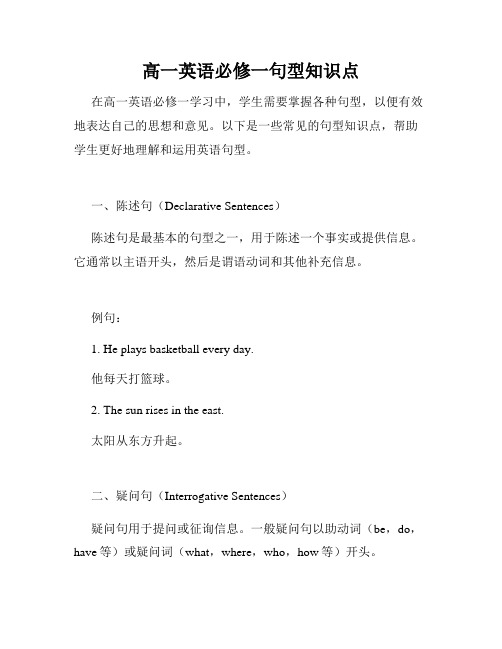
高一英语必修一句型知识点在高一英语必修一学习中,学生需要掌握各种句型,以便有效地表达自己的思想和意见。
以下是一些常见的句型知识点,帮助学生更好地理解和运用英语句型。
一、陈述句(Declarative Sentences)陈述句是最基本的句型之一,用于陈述一个事实或提供信息。
它通常以主语开头,然后是谓语动词和其他补充信息。
例句:1. He plays basketball every day.他每天打篮球。
2. The sun rises in the east.太阳从东方升起。
二、疑问句(Interrogative Sentences)疑问句用于提问或征询信息。
一般疑问句以助动词(be,do,have等)或疑问词(what,where,who,how等)开头。
例句:1. Are you ready for the exam?你准备好考试了吗?2. Where is the library?图书馆在哪里?三、祈使句(Imperative Sentences)祈使句用于发出命令、请求或建议。
它通常省略了主语,只使用动词的原形。
例句:1. Close the door, please.请关门。
2. Be quiet in the library.在图书馆保持安静。
四、感叹句(Exclamatory Sentences)感叹句用于表达强烈的感情或惊奇。
它通常以What或How开头,并在句末使用感叹号。
例句:1. What a beautiful sunset!多么美丽的日落啊!2. How talented he is!他多么有才华啊!五、条件句(Conditional Sentences)条件句用于表示假设,其中包含一个条件和一个结果。
它通常由if引导。
例句:1. If it rains, we will stay at home.如果下雨,我们会待在家里。
2. I will go to the party if I finish my homework.如果我完成作业,我会去参加晚会。
必修一unit3TravelJournallanguagepoints语言点

All the members attended a meeting in the club yesterday.
in the club that all the members attended a meeting yesterday. (强调地点状语)
It
was yesterday that all the members a attended meeting in the club. (强调时间状语)
2. I was able at last to ____ my mother
to follow my advice.
A. suggest
B. advise
C. persuade
D. leave off
高考链接
While shopping, people sometimes
can’t help ____ into buying something
realize one’s dream = one’s dream come true 实现某人的理想
4. Two years ago she bought an expensive
mountain bike and then she persuaded me to
buy one.
persuade vt.说服; 劝服; vi.被说服
1. Which kind of transport do you prefer to use: bus or train? [注] transport “运输工具”,不可数名 词, 常构成短语means/form of transport。
如: ① Please find another means of transport. ② It’s easier to go to work if you have yourad of doing B
高一英语-人教版-必修一-全册重点单词短语及句型的归纳

必修IUnit 1重点单词和短语1、add up合计add up to…共计, 总计达add…to把…加在里面2、upset sb. 某人担忧upset oneself about sth. 为某事而苦恼be upset at/about 因…而苦恼3、ignore sb./sth. 忽视,不理睬be ignorant of 对… 无知,不了解ignorant adj 无知的,愚昧的ignorance n 无知.愚昧4、calm vt.&vi. (使)安静;(使)镇静calm down 冷静, 安静calm sb. down 使某人冷静 adj. 安静的;镇静的keep calm 保持冷静5、concern vt. 使担忧;涉与;关系到 n. 担忧;关注with concern 关切地show (no) concern for/about sb. 对某人(不)关切,concern oneself with/ in 参与,干涉be concerned with 与… 有关系be concerned about/ for sth. /that-clause 为…担忧,挂念As far as… be concerned 就某某而言concerning prep. 关于,有关6、walk the dog 遛狗7、go through 经验, 经受go through a hard time 经验了一段困难时期go through the baggage 检查行李go through the newspaper 阅读报纸go through lots of money 花了很多钱8、set down. 登记,放下Set aside 留出,腾出(时间,金钱),把…放一边Set off 动身,动身,引起,使爆炸Set up 建立Set about doing 起先,着手Set out to do sth.set down the ideas on paper 把想法写在纸上set me down at the bus-stop 在车站让我下车9、a series of 一系列的, 一连串的a series of books 丛书 a series of stamps 一套邮票a series of pictures 连环画10、on purpose 有意地= by design= deliberately by chance/accident= accidentallylie to sb. on purpose 有意向某人撒谎on purpose to do sth. 为了…而特地go there on purpose to see sb. 特意到那里去看某人for/with the purpose of 为了…地目的11、in order to/ so as to (do sth.) 为了, 以……为目的so as to “为了”, 只能用在句中。
人教新课标必修1 unit 3考点归纳

1. Which kind of transport do you prefer to use: bus or train?考点:Prefer to do rather than do 或者是prefer A to B ,关键点在于如何看出对等结构。
1)I'd prefer ________ at home, watching TV rather than ________ to the cinema.A.to stay, to go B.staving, going C.to stay, going D.to stay, go2)Rather than _____ on a crowded bus, he always prefers _____ a bicycle.A. ride; rideB. riding; rideC. ride; to rideD. to ride; riding3)--- Do you think the Stars will beat the Bulls?--- Yes. They have better players, so I ______ them to win.A. hopeB. preferC. expectD. want4)——Why are the tax collectors so busy?——Many people prefer to have their tax forms completed by a professional rather than ___.A、do it themselvesB、doing it themselvesC、to do it themselvesD、done by themselves2. Ever since middle school, my sister and I have dreamed about taking a great bike trip.1) John promised his doctor he ____ not smoke, and he has never smoked ever since.(08北京)A. mightB. shouldC. couldD. would2) When Mary left college she had her hair cut short and ___it short ever sinceA. has worn B .wore C. would wear D. was wearing3).—Ann will be sent abroad very soon.—She never dreams of________ such a chance.A. beingB. there beC. there toD. there being4). He was poor but ______ being rich.A. dream ofB. dreamed aboutC. dream aboutD. dream about of5). (09海南)13. His sister left home in 1998, and ________since.A. had not been heard ofB. has not been heard ofC. had not heard ofD. has not heard of6). For many years, people __ electric ears. However, making them has been more difficult than predicted. (10年浙江)A. had dreamed ofB. have dreamed ofC. dreamed ofD. dream of3. She persuaded me to buy one.1). If she doesn’t want to go, nothing you can say will _____ her.(2012年高考新课标卷)A. persuadeB. promiseC. inviteD. support常见短语:persuade somebody to do something= persuade(talk) somebody into doing something.persuade somebody of something = convince somebody of something.4. After graduating from college, we finally got the chance to take a bike trip.连词after\before在使用的时候,如果是连接句子,就是连词,一旦放在非谓语中,它们就变成了介词。
高一英语必修一第三课重点知识点
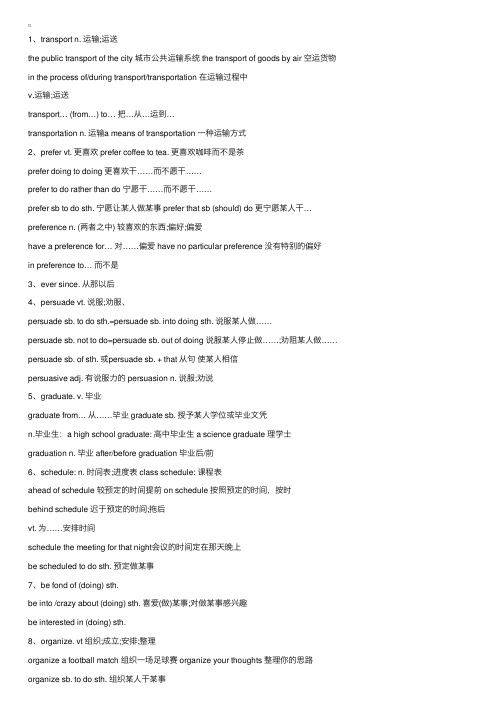
1、transport n. 运输;运送the public transport of the city 城市公共运输系统 the transport of goods by air 空运货物in the process of/during transport/transportation 在运输过程中v.运输;运送transport… (from…) to… 把…从…运到…transportation n. 运输a means of transportation ⼀种运输⽅式2、prefer vt. 更喜欢 prefer coffee to tea. 更喜欢咖啡⽽不是茶prefer doing to doing 更喜欢⼲……⽽不愿⼲……prefer to do rather than do 宁愿⼲……⽽不愿⼲……prefer sb to do sth. 宁愿让某⼈做某事 prefer that sb (should) do 更宁愿某⼈⼲…preference n. (两者之中) 较喜欢的东西;偏好;偏爱have a preference for… 对……偏爱 have no particular preference 没有特别的偏好in preference to… ⽽不是3、ever since. 从那以后4、persuade vt. 说服;劝服、persuade sb. to do sth.=persuade sb. into doing sth. 说服某⼈做……persuade sb. not to do=persuade sb. out of doing 说服某⼈停⽌做……;劝阻某⼈做……persuade sb. of sth. 或persuade sb. + that 从句使某⼈相信persuasive adj. 有说服⼒的 persuasion n. 说服;劝说5、graduate. v. 毕业graduate from… 从……毕业 graduate sb. 授予某⼈学位或毕业⽂凭n.毕业⽣:a high school graduate: ⾼中毕业⽣ a science graduate 理学⼠graduation n. 毕业 after/before graduation 毕业后/前6、schedule: n. 时间表;进度表 class schedule: 课程表ahead of schedule 较预定的时间提前 on schedule 按照预定的时间,按时behind schedule 迟于预定的时间;拖后vt. 为……安排时间schedule the meeting for that night会议的时间定在那天晚上be scheduled to do sth. 预定做某事7、be fond of (doing) sth.be into /crazy about (doing) sth. 喜爱(做)某事;对做某事感兴趣be interested in (doing) sth.8、organize. vt 组织;成⽴;安排;整理organize a football match 组织⼀场⾜球赛 organize your thoughts 整理你的思路organize sb. to do sth. 组织某⼈⼲某事9、care about 关⼼;忧虑;惦念 care for 喜欢;照顾10、determine vt.& vi.确定;决定;使…下定决⼼determine sth. 确定某事 determine to do 决定做某事determine sb. to do sth. 使某⼈决定做某事determine on early start=determine to start early 决定早动⾝ determine +从句determined adj 已决定了的;坚定的;坚决的be determined that 从句be determined to do sth 决定⼲某事=make up one’s mind to doa determined look 坚定的表情 a determined man 意志坚定的⼈determination 决定;决⼼ with determination 坚决地a man of great determination 意志坚定的⼈11、go on/ make/ take a journey to sp. 去某地旅⾏12、altitude. n. 海拔;⾼处at an altitude of =at a height of 在……⾼度at 表⽰“在……处/时;以……” at a price of 以……的价格at a speed/ rate of 以……速度 at a length of 在……长度at a depth/ width of 在……深度,宽度 at a distance of 在……远的距离at the cost of 以……为代价13、make up one’s mind 下决⼼ read one’s mind 看出某⼈⼼思keep one’s mind on 专⼼于 speak one’s mind 直⾔不讳bear/ keep sth. in mind 记住某事14、give in (to sb./ sth.) (向……)屈服;让步;投降 give off 发出(蒸汽、光、热等) give out 分发;筋疲⼒尽 give way to 让位于;妥协15、pace. n. ⼀步;速度;步调 at a good pace 相当快地keep pace with 跟……齐步前进16、attitude, n. 态度;看法take a friendly attitude to/ towards us. 对我们采取友善的态度hold a positive/ negative attitude 持积极/消极态度17、as usual: 照常18、at midnight 在午夜 at noon 在正午19、flow through sp. 流经某地20、insist v. 坚决要求;主张insist on (sb’s) doing sth. 坚决要求(某⼈)做insist on (my) giving up smoking 坚决要求(我)戒烟insist + 从句He insisted that he was right. 他坚持认为他是正确的He insisted that he should be set free. 他坚决要求他被释放21、go/ run like clockwork 按计划进⾏;进展顺利22、weather forecast 天⽓预报23、view. n. 视野;视⼒;景⾊;看法;观点be/ go out of view 从视野消失 come into view 进⼊视线admire the view 欣赏景⾊ in my view = from my point of view 依我看来take the view that 从句,持有……观点 V. 考虑;观看view sb. as sth. 把……看作24、put up the tents. 搭起帐篷 put up your hands 举⼿put up the post 张贴海报 put up ten people for night 为⼗⼈提供⾷宿过夜25、give my love/ best wishes to sb. 请代我向……问好/候。
高一英语必修一unit1知识点

高一英语必修一unit1知识点高中英语必修一Unit 1 知识点梳理一、词汇与短语1. 形容词与副词- 形容词用于描述名词的特征或属性,如:beautiful, interesting, difficult。
- 副词用来修饰动词、形容词或其他副词,表达方式、程度、时间等,如:quickly, usually, very。
2. 常用短语- as soon as possible:尽快地- as…as:和…一样- take place:发生- in order to:为了- be full of:充满- be strict with:对…严格- look forward to:期待二、语法点1. 比较级和最高级- 形容词和副词的比较级和最高级的构成规则,以及它们的基本用法。
- 比较级用于比较两者,最高级用于比较三者以上。
2. 现在完成时- 现在完成时的构成:助动词have/has + 过去分词。
- 现在完成时表示过去发生的动作对现在造成的影响或结果,或者从过去开始一直持续到现在的动作。
3. 一般现在时- 一般现在时的构成:主语 + 动词原形/第三人称单数形式。
- 一般现在时用于描述经常发生的动作、习惯、事实或状态。
三、阅读理解技巧1. 快速浏览(Skimming)- 快速浏览文章,抓住文章的主旨大意。
- 通过标题、图片、段落首句和尾句等信息进行判断。
2. 寻找主题句- 主题句通常位于段落的开头,概括了该段落的主要内容。
- 通过主题句可以更好地理解段落的核心思想。
3. 推理判断- 根据上下文线索,推断生词或难句的意思。
- 通过逻辑关系和文章结构进行推理。
四、写作技巧1. 开头引入- 使用引人入胜的开头,如引用名言、提出问题或描述一个场景。
- 开头应简洁明了,直接引入文章主题。
2. 正文论述- 按照逻辑顺序组织文章,每个段落只讨论一个中心点。
- 使用恰当的连接词,使文章结构清晰,逻辑性强。
3. 结尾总结- 总结文章的主要观点,重申文章的中心思想。
高一英语必修1知识点总结(精彩5篇)

高一英语必修1知识点总结(精彩5篇)高一英语必修1知识点篇一1、基础梳理diary fare transport finally persuade stubborn organize source determine altitude reliable forecast beneath sightseeing insurance bend dream of/about doing sth persuade sb to do get sb interested in make one’s mind give up care forbe determined to do can’t wait/can hardly wait to do sth2、词语归纳1)transport作动词,常和from…to…连用。
作名词,也可是transportation,表示“运输,运送;运输工具,交通车辆”。
常用词组:be transported with… 情不自禁in transports of sth 情不自禁2)persuade作动词,后常接指人的代词或者是名词。
意为“劝说好某人”。
persuade sb to do sth “劝说某人做某事”。
persuade 表示劝说是成功的,若表示劝而不服,不能用persuade,通常在其前加try to 或者是want to ,也可以用advise。
persuade sb into doing sth 说服某人做某事persuade sb out of sth 说服某人不要去做某事persuade还可以表示“使某人相信”,常见用法:persuade sb that+从句persuade+of短语be persuaded that+从句3)insist是动词,后接介词on+名词或者动名词,也可以加他that从句,表示“坚决,强调,坚持主张”,从句中谓语动词要用虚拟语气,即should+动词原形,should可以省略。
高中英语必修一知识点总结

高中英语必修一知识点总结高中英语必修一知识点One Friendship一、重点短语1.go through 经历,经受get through 通过;完成;接通电话2. set down 记下,放下3. a series of 一系列4. on purpose 有目的的5. in order to 为了6. at dusk 傍晚,黄昏时刻7. face to face 面对面8. fall in love 爱上9. join in 参加(某个活动);take part in 参加(活动)join 加入(组织,团队,并成为其中一员)10. calm down 冷静下来11. suffer from 遭受12. be/get tired of…对…感到厌倦13. be concerned about 关心14. get on/along well with 与…相处融洽15. be good at/do well in 擅长于…16. find it + adj. to do sth. 发现做某事是…17. no longer / not …any longer 不再…18. too much 太多(后接不可数n.)much too 太…(后接adj.)19. not…until 直到… 才20. it’s no pleasure doing sth 做… 并不开心21. make sb. sth. 使某人成为…make sb. do sth. 使某人做某事二、语法----直接引语和间接引语概念:直接引语:直接引述别人的原话。
一般前后要加引号。
间接引语:用自己的话转述别人的话。
间接引语在多数情况下可构成宾语从句且不要加引号。
例:Mr. Black said, “ I’m busy.”Mr. Black said that he was busy.变化规则(一)陈述句的变化规则直接引语如果是陈述句,变为间接引语时,用连词that(可省略)引导,从句中的人称、时态、指示代词、时间状语、地点状语都要发生相应的变化。
高中英语必修1知识点归纳

高中英语必修1知识点归纳高中英语必修1的语法,词组,句型的知识点你都掌握好了吗?接下来店铺为你整理了高中英语必修1知识点归纳,一起来看看吧。
高中英语必修1语法知识点归纳1.whether VS if 的用法2.tell sb to do sth ask sb not to do sth3.be+doing表将来4.定语从句:只用that的情况只用who的情况只用which的情况as VS whichthe same…as/that…such…asas…as介词+which/whomwhich引导一个句子的用法非限制性定语从句which引导一个句子的用法非限制性定语从句插入语I think I believe I guess I thought间隔式定语从句Is this car the one he bought last year?Is this the car he bought last year?What的用法5.will be donebe about to be donebe to be donebe going to be done6.has/have been done7.be being done加always表示一种厌烦等语气8.强调句it is+被强调部分+that从句It is not until+时间+that从句特殊疑问词+is it that从句9.倒装句部分否定,含有否定词的hardly never little only seldom 等,把情态动词,be动词,助动词提到主语的前面10.as if , insist suggest request command ,从句用虚拟语气,用(should)do.高中英语必修1词组知识点归纳1. add up 合计2. upset vt&vi 弄翻,使…不安,使心烦,扰乱adj. 心烦意乱的,不舒服的,不适的,难过的.3. ignore不理睬、忽视4. calm (使)平静、(使)镇定calm down 平静/镇定下来5. have got to 不得不、必须6. concern (使)担忧、涉及、关系到be concerned about…关心,挂念7. go through 经历、经受8. set down 记下、放下、登记9. a series of 一系列10. on purpose 故意11. in order to 为了……12. at dusk 在黄昏时刻13. face to face 面对面地14. no longer/not…any longer 不再……15. settle 安家、定居、停留16. suffer 遭受、忍受、经历17. suffer from 遭受、患病18. recover 痊愈、恢复、重新获得19. get/be tired of 对……厌烦20. pack 捆扎,包装/包裹21. pack (sth) up 将(东西)装箱打包22. get along with 与……相处23. fall in love 爱上24. disagree 不同意25. join in 参加高中英语必修1句型知识点归纳1. It was the first time in a year and a half that I had seen the night face to face. (从句时态用完成时)这是我一年半以来第一次目睹夜晚。
必修一英语重点归纳总结
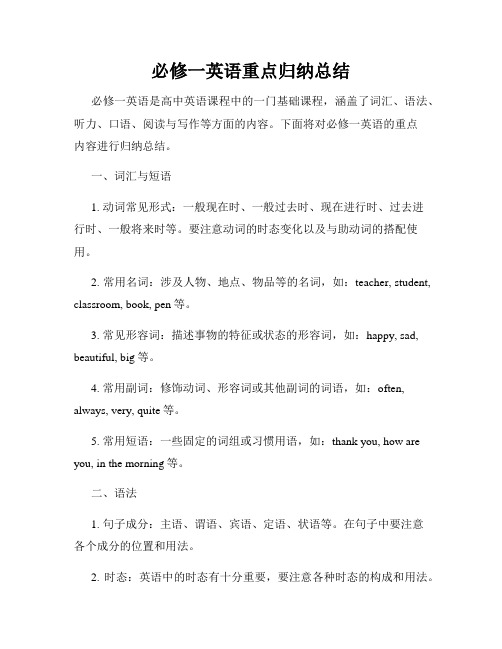
必修一英语重点归纳总结必修一英语是高中英语课程中的一门基础课程,涵盖了词汇、语法、听力、口语、阅读与写作等方面的内容。
下面将对必修一英语的重点内容进行归纳总结。
一、词汇与短语1. 动词常见形式:一般现在时、一般过去时、现在进行时、过去进行时、一般将来时等。
要注意动词的时态变化以及与助动词的搭配使用。
2. 常用名词:涉及人物、地点、物品等的名词,如:teacher, student, classroom, book, pen等。
3. 常见形容词:描述事物的特征或状态的形容词,如:happy, sad, beautiful, big等。
4. 常用副词:修饰动词、形容词或其他副词的词语,如:often, always, very, quite等。
5. 常用短语:一些固定的词组或习惯用语,如:thank you, how are you, in the morning等。
二、语法1. 句子成分:主语、谓语、宾语、定语、状语等。
在句子中要注意各个成分的位置和用法。
2. 时态:英语中的时态有十分重要,要注意各种时态的构成和用法。
3. 从句:主要包括定语从句和状语从句,要注意从句的引导词和从句本身的语法结构。
4. 被动语态:被动语态表示主语是动作的承受者,要掌握被动语态的构成和用法。
5. 倒装句:倒装句是英语中的一种语法现象,要注意倒装句的构成和用法。
三、听力1. 听力材料:关注听力材料中的对话和文章,注意听力材料中的重点词汇和语法结构。
2. 听力技巧:培养良好的听力技巧,如抓住关键词、理解上下文等。
3. 听力训练:通过大量的听力训练来提高听力水平,可以选择一些英语听力材料进行练习。
四、口语1. 口语表达:加强口语训练,提高口语表达能力,可以与他人进行英语对话练习。
2. 语音语调:注意正确的语音和语调,如重读音节、音调的上扬与下降等。
3. 实践机会:利用各种实践机会,如参加英语角、英语演讲比赛等,提高口语能力。
unit1高中英语必修第一册重点词汇与短语
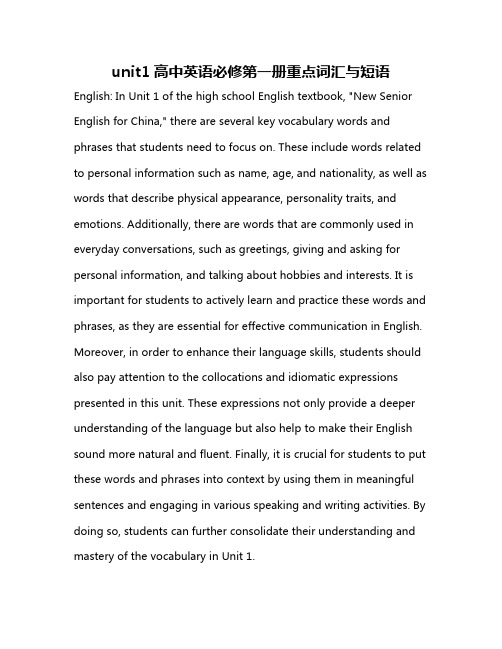
unit1高中英语必修第一册重点词汇与短语English: In Unit 1 of the high school English textbook, "New Senior English for China," there are several key vocabulary words and phrases that students need to focus on. These include words related to personal information such as name, age, and nationality, as well as words that describe physical appearance, personality traits, and emotions. Additionally, there are words that are commonly used in everyday conversations, such as greetings, giving and asking for personal information, and talking about hobbies and interests. It is important for students to actively learn and practice these words and phrases, as they are essential for effective communication in English. Moreover, in order to enhance their language skills, students should also pay attention to the collocations and idiomatic expressions presented in this unit. These expressions not only provide a deeper understanding of the language but also help to make their English sound more natural and fluent. Finally, it is crucial for students to put these words and phrases into context by using them in meaningful sentences and engaging in various speaking and writing activities. By doing so, students can further consolidate their understanding and mastery of the vocabulary in Unit 1.中文翻译: 在高中英语教材《新高中英语(快捷版)》的第一单元中,有几个需要学生重点关注的关键词汇和短语。
